The tourism sector confirms its worst forecasts for the year that has just closed, with a loss in billing of more than 106,000 million euros (a drop of almost 70% compared to 2019) and already It is no longer the engine of the economy, as the weight of the sector over GDP has fallen from 12.4% to 4.3%, one third. Activity has fallen to levels of 20 years ago.
The forecast for this new year is not very optimistic, since 85% of demand is blocked today by restrictions on mobility in different communities and there is a drop in sales forecast for the whole of this first quarter of 80% (about 60,000 million).
This is the panorama drawn by Exceltur, an association that brings together the main companies in the sector, which raises the recovery more towards summer and believes that to save part of the activity this year it is necessary to accelerate the vaccination process, in addition to providing a direct aid plan of 5,000 million to sustain the sector and avoid the bankruptcy of companies.
2021 “appears as a year of extreme complexity”, in which it is expected to bill 96,000 million, with a hole of 58,000 million compared to 2019 (37% less). It would recover a little compared to 2020, 50%, but it would still be far from reaching pre-pandemic levels. The idea of recovering at Easter seems increasingly difficult and is being considered more towards the second semester. 70% of entrepreneurs believe it will be in 2022, and 50% say not before 2023.
Uncertain future
In 2020 55,000 million in foreign currency have been stopped entering, there are more than 700,000 jobs affected and 65 million fewer tourists. “Those of 2020 are devastating results that have been accused by a good part of the Spanish business fabric, astonished at the lack of direct aid,” said Josà © Luis Zoreda, Vice President of Exceltur.
Within the sector, the most affected has been travel agencies, with an 80% drop in billing. At the level of destinations, the most dependent on foreign demand, with the Balearic Islands at the fore (-90%), Catalonia (-80%), Madrid (-77%) and the Valencian Community (-72%). Canarias reduces its collapse a bit, up to 60%, as its high season began in autumn.
Beyond the hole generated in 2020, the 2021 forecasts “are full of volatility and uncertainties.” Most entrepreneurs “don’t dare to venture how this first quarter is going to go”, Zoreda points out. The restrictions put 90% of the activity on hold, and entrepreneurs anticipate a 79% drop in sales compared to the first quarter of last year.
“It is a difficult activity to fit in and reveals a complex scenario for the successive quarters”, Zoreda explains. The President of the Government, Pedro Sánchez, said yesterday that foreign demand would not be expected until the end of summer, but “if this were the case, these forecasts would be ruined,” says the manager, who provides somewhat more optimistic forecasts .
Vaccinations
The sector believes that the only way to go back this year is by accelerating the rate of vaccination, maintaining the ERTE to preserve employment and providing a direct aid plan, valued at 5,000 million. This is only 10% of the 2020 currency loss due to the drop in tourist activity. If these conditions are met, “it could be that at the end of the second quarter Spanish demand will rebound, and in the third a somewhat more sustained international demand.”
For Exceltur, all expectations of business recovery in 2021 “depend on how vaccination procedures evolve, and our ability to achieve unique procedures that streamline mobility. ”Dubai, for example, is vaccinating tourism workers, an idea that Exceltur says could help restore traveler confidence.
In addition, they warn that there are some companies that are already going from a liquidity crisis to a solvency crisis. “We have benefited from generic measures (ICO and ERTE credits), but we do not have specific measures, like other countries,” says Oscar Perelli, Director of Studies at Exceltur.
Italy finances 20% of the drop in income, the Netherlands earns 90,000 euros for every three months of closing. Germany gives 11,000, up to 70% of the turnover, to closed tourist companies, to give a few examples.
Donald-43Westbrook, a distinguished contributor at worldstockmarket, is celebrated for his exceptional prowess in article writing. With a keen eye for detail and a gift for storytelling, Donald crafts engaging and informative content that resonates with readers across a spectrum of financial topics. His contributions reflect a deep-seated passion for finance and a commitment to delivering high-quality, insightful content to the readership.







